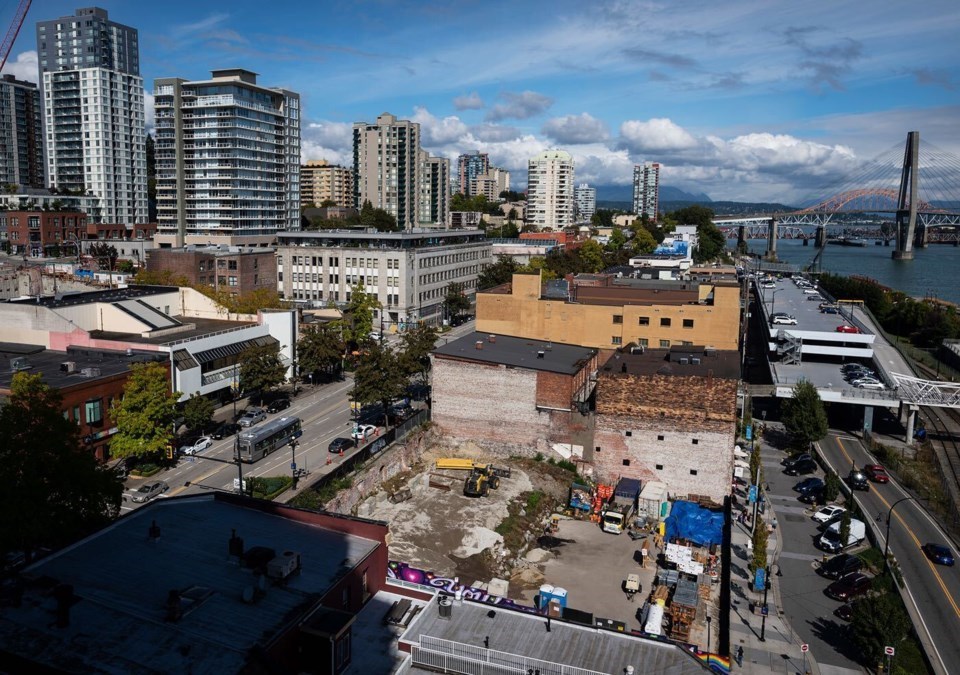Could small businesses someday pop up in shipping containers in New Westminster?
The City of New Westminster will explore the use of shipping containers to create micro-retail spaces that would provide affordable storefront spaces for small businesses, artisans, and artists – while enhancing commercial areas and corridors. Staff will report back to council on the feasibility of implementing a program.
Coun. Ruby Campbell said it’s an “exciting time” as the city has recruited a staff person to start implementation of its retail strategy. Campbell and Coun. Nadine Nakagawa, who put forward a motion for council’s consideration, have discussed the emerging trend of micro-retailing and have heard from local businesses who are interested in the idea.
“There's a strong interest to have opportunity for multiple vendors to co-locate in shared spaces,” Campbell said. “Some also want to use shared resources or have opportunity to lease rental units that are much smaller than the average size, which we've heard … are difficult to lease.”
Campbell said a micro retailing option provides some businesses and artisans with the entry point to test their product or services and gives some businesses an opportunity to test out a potential brick and mortar location without incurring the financial impact. In some cases, she said businesses have online sales, but need a place to showcase their products or services.
“The hope is to have shipping containers provide that space and locate at key public or private points in the city, and to help activate sections of the streetscape that can also help existing brick and mortar businesses,” she said. “I know Vancouver and other municipalities across North America are implementing similar programs in empty parking lots, in some in sections of roads or in conjunctions with private partners.”
Nakagawa said she first noticed this concept in Langford, where the city had placed shipping containers along a former rail line. She said they served as an incubator for business and created a lively spot that was visited by residents and visitors.
“I think there's a real opportunity to add some vibrancy to our retail districts and our streetscapes, which actually benefits all businesses,” she said. “We know the more people are on the street noticing local businesses, the better it is for those businesses.”
Nakagawa said the initiative could potentially provide a leg up for people who want to start something exciting in the community.
“We know that it's hard to start a small business,” she said. “It's a real risk, and people invest a lot of themselves, a lot of their finances into it.”
At its Aug. 26 meeting, council unanimously approved a motion from Campbell and Nakagawa aimed at enhancing commercial areas and corridors in New Westminster. The motion called on New Westminster to identify potential locations, operating considerations, necessary resources and local partners to activate “combination stores and micro-retailing commercial areas” using shipping containers or similar concept to create a retail ecosystem that provides small businesses, artists, artisans, crafters and other vendors with affordable storefront locations – and, at the same time, enhances commercial areas and corridors.
Coun. Daniel Fontaine supports the concept of micro retailing, having seen a successful example in Vancouver.
“There were a number of containers that were there. It was quite active, a lot of little shops within the containers,” he said. “The concept definitely can work if placed in the right location and if done well and properly marketed. So, there is some opportunity for us.”
Fontaine supported the motion, but stressed the city’s primary responsibility should be addressing the issue of vacant lots in the city, including those on Columbia Street.
“I think it's an interesting concept, as long as we keep our eye on the ball, and we realize that we need to fill up our main commercial areas, like in Sapperton, the downtown and Queensborough, etc.,” he said.
Coun. Paul Minhas, who owns a business on Columbia Street, agreed that location will be key to implementation of the initiative. He said it’s important to bring vibrancy to commercial areas at a time when a lot of brick-and-mortar businesses are struggling.
“The challenges are immense for them,” he said. “I do not want those brick-and-mortar businesses to be forgotten and left behind. They're struggling as it is.”
Fontaine said he’d be concerned if containers were in front or directly adjacent to existing brick- and-mortar business. He questioned if containers could be set up on vacant properties that are privately owned.
Blair Fryer, the city’s acting director of community services, said there may be some opportunities on vacant sites, but it’s more difficult to activate private land than public spaces. Once council approves the motion, he said staff would look at how to go about developing and then implementing something like this.
If private lots are considered for this initiative, Minhas said the city needs to be “very careful” that it doesn’t slow the development process for those properties. He said some vacant lots are “prime locations” for redevelopment.
“We have to really, really be very, very mindful of how we do it,” he said.
📣 Got an opinion on this story or any others in New Westminster? Send us a letter or email your thoughts or story tips to [email protected].
📲 Want to stay updated on New West news? Sign up for our free daily newsletter.
💬 Words missing in an article? Your adblocker might be preventing hyperlinked text from appearing.



